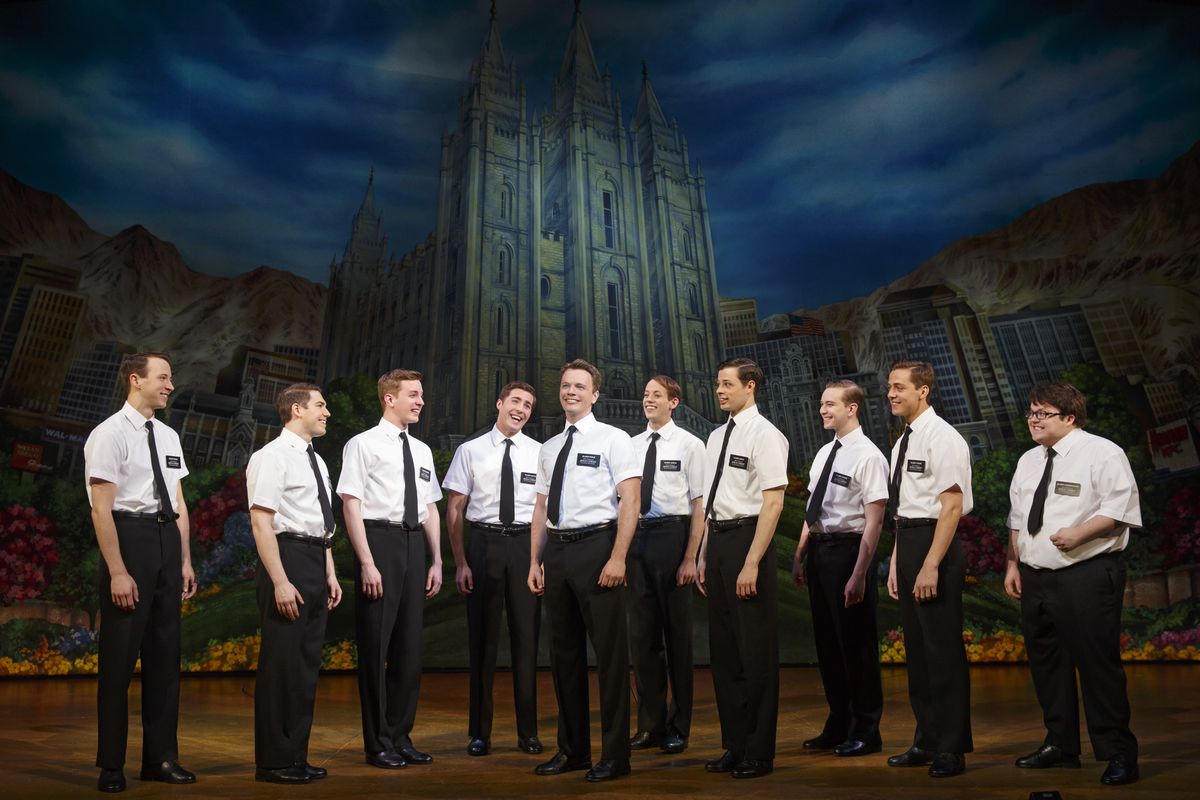Humor by the ‘Book’
Broadway hit ‘Book of Mormon’ knows how to cross the line

When “South Park” premiered on a fledgling network called Comedy Central in August 1997, it instantly shook up the pop culture landscape, inspiring debates about the decay of moral decency in America and shattering cable ratings records.
Few people could have guessed that the show would still be churning out new episodes nearly two decades later; even fewer could have imagined that its creators, Trey Parker and Matt Stone, would one day be two of the biggest names on Broadway.
Parker and Stone’s hugely successful musical “The Book of Mormon” begins a limited run in Spokane on Tuesday as part of the Best of Broadway series, the same week “South Park” premiered 17 years ago. Tremendously popular, critically adored, unapologetically crude and gleefully offensive, “The Book of Mormon” won a whopping nine Tony Awards in 2011, including Best Musical and Best Original Score, and a Grammy for Best Musical Theater Album.
David Larsen, who leads the cast of the touring production heading to Spokane, says the show’s popularity stems from its mixture of scurrilous “South Park” humor with old-fashioned Broadway sensibilities – it’s essentially “The King and I” with a slurry of four-letter words and scatological jokes tacked on. (In case you weren’t already clued in, this is a very R-rated show.)
“It’s written like a traditional musical,” Larsen said from Seattle, where the show is finishing up a three-week run at the Paramount Theatre. “From tap dancing to big ballads, it has it all. The fact that it has a sense of humor that’s constantly ready to cross a line is what makes people embrace it.”
With “The Book of Mormon,” Parker, Stone and their collaborator Robert Lopez (Tony winner for “Avenue Q,” Oscar winner for that “Let It Go” earworm from “Frozen”) have found a happy middle ground in terms of courting two typically disparate audiences: The edgy nature of the show appeals to Parker and Stone’s fan base, while the flashy song-and-dance numbers speak to theater crowds who might not be caught dead watching “South Park.”
Larsen stars as Elder Price, an optimistic, unwaveringly enthusiastic Mormon missionary whose Salt Lake City congregation sends him to Uganda to preach the teachings of the Church of Jesus Christ of Latter-day Saints. Along with the bumbling Elder Cunningham, who hasn’t actually read the Book of Mormon, Price encounters a remote village affected by AIDS and famine and begins to convert its people to Christianity. (The villagers’ motto, when translated into English, is unprintable; the name of the murderous warlord terrorizing them even more so.)
“He’s the ultimate do-gooder, and he expects everything to be handed to him,” Larsen said of Elder Price. “He is the best, and he knows he’s the best.” Throughout the show, Price repeatedly has his faith shaken, but he remains steadfast in his convictions (“I am a Mormon, and dang it, a Mormon just believes,” he sings).
Larsen, a Portland-area native who has previously appeared on Broadway in “American Idiot” and “Billy Elliot,” says his approach to the role is to play it as straight as possible. If it ever appears that Price is in on the joke, the entire foundation of the show breaks down.
“If you don’t believe that he believes what’s he’s saying is absolutely true, it makes no sense,” Larsen said.
Despite sparking some controversy because of its adult content, “The Book of Mormon” is a surprisingly affectionate show – it might skewer organized religion, but it doesn’t angrily attack it. Not all Mormon officials have embraced Parker and Stone’s vision, but Larsen says many of them seem to have a sense of humor about it, and LDS churches around the country have actually purchased advertising space in the show’s playbills (one wrote, “You’ve seen the play, now read the book”).
“People are always justified in what they feel,” Larsen said. “Whether that was the intent of the writers is something completely different. That’s what’s so awesome about live theater: People can feel about it however they want to feel about it, but if anybody knows ‘South Park’ humor, they know that nobody’s safe. They make fun of everybody. No person should be so offended that they got made fun of, because everybody’s going to get made fun of.”
And even if Parker, Stone and Lopez get laughs at the expense of Price’s gee-whiz enthusiasm in the face of unspeakable horrors, the humor comes from a place of affection and understanding: Sure, they’re trying to shock, appall and offend, but they never come across as closed-minded bullies.
“Ultimately, they’re just trying to make the world a better place,” Larsen said of the show’s overwhelmed but well-meaning missionaries. “And whether or not you believe in any religion, how could that ever be bad?”